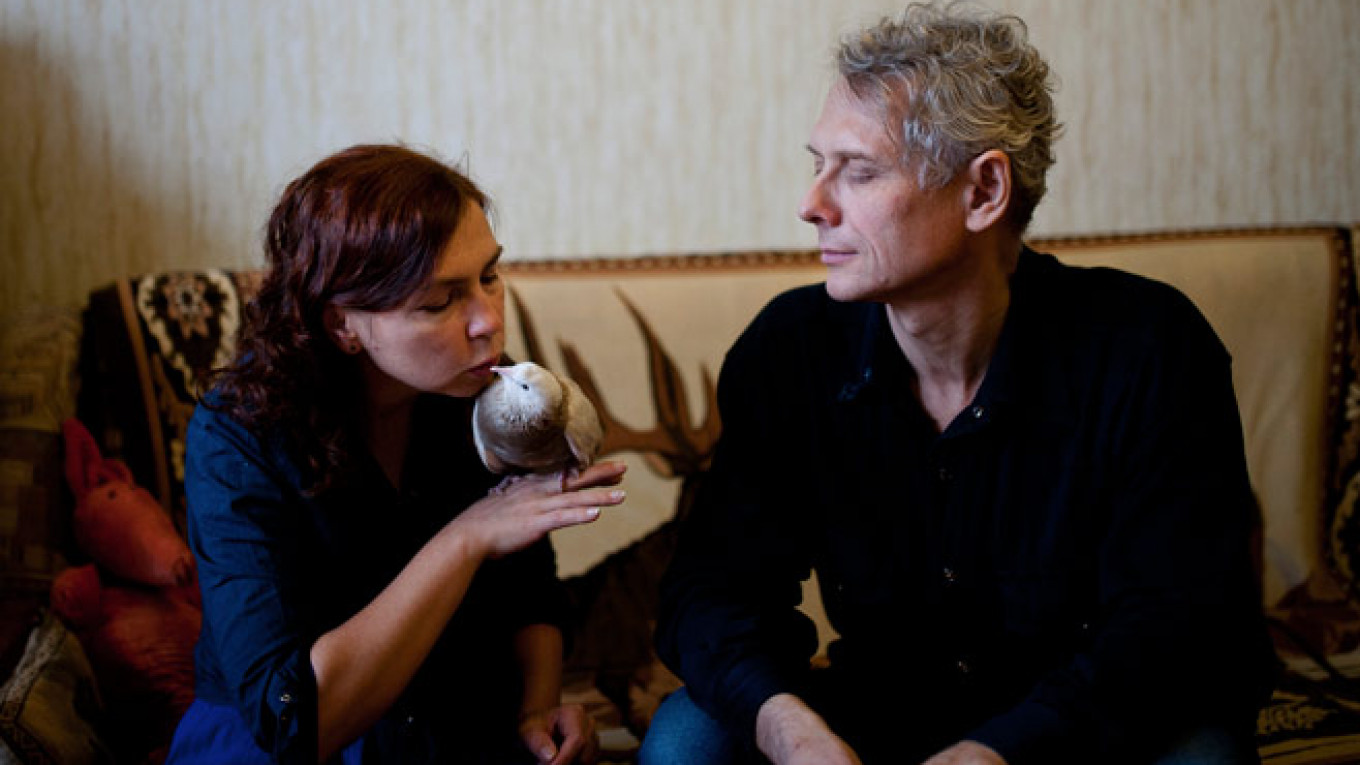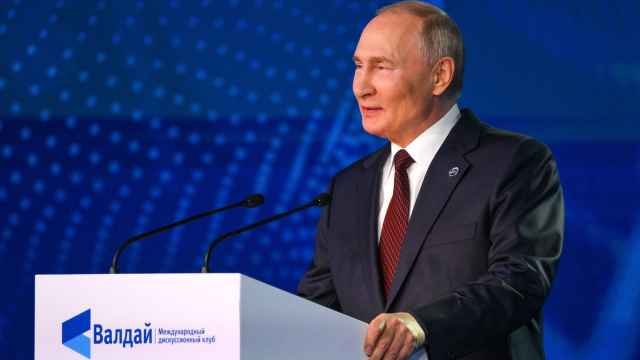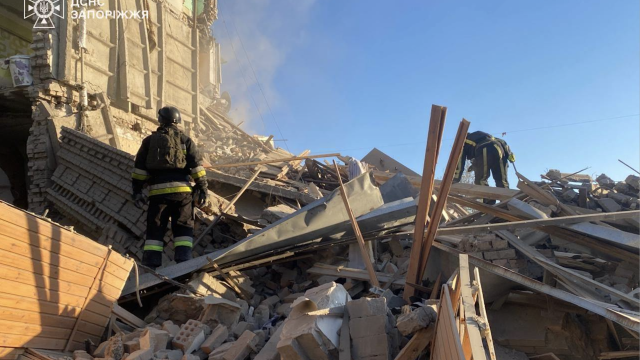"Sit down, you bastard," growled the circus trainer.
The monkey glanced around and tried to slink away, then screeched as his minder lashed out with a horse whip. Moments later, the animal's face was jerked sideways by a slap. The crack of contact rings out on the film, secretly recorded in the back rooms of a Russian circus.
What follows is 12 minutes in which two monkeys, Johnny and Kuzya, are shaken, punched and hammered against the floor by trainers at St. Petersburg State Circus, one of the country's biggest. A kangaroo, Charlie, is whipped while rehearsing a boxing act in red gloves. Fluffy poodles are struck with a whip. An ostrich receives a flying kick. When not with their minders, the animals are shown looking out at the camera from small metal cages.
The film was published by Vita, an animal rights organization led by Irina Novozhilova and Konstantin Sabinin, in April 2013.
Within days, the video had 100,000 views on YouTube. Celebrities and veterinarians called for an end to animal performances in the circus, and Vita requested an official investigation into the trainers caught on camera.
Under pressure, some circus officials and performers said the footage was fake — the St. Petersburg circus told The Moscow Times that the trainers caught on camera were touring artists and the film could have been shot anywhere.
Others defended the violence, comparing it to parents disciplining their children, some of whom "must be beaten, otherwise they won't understand," Askold Zapashny, the artistic director of the Moscow Bolshoi Circus, told online newspaper a few days after the video emerged.
Later, in 2014, Vita had another expose, publishing images of the gashed face of a lion cub on its way to Moscow by train. Vita said trainers linked to Russia's famous Zapashny theater troupe had forced the four-month-old animal to jump through a ring of fire and then sold it, burned and beaten, to a woman in Moscow.
Circus Fightback
As the scandal unfolded, it became clear to Vita that they had stepped on big money and powerful interests. In Russia the circus has a prestigious place in national culture, and many of its acts have historically used animals.
Two of the trainers identified on the behind-the-scenes film by Vita, Murad Abdullayev and Rauf Rasulov, had received state recognition as "Honored Artists." Askold and Edgard Zapashny, who run Moscow's Bolshoi Circus, are members of a dynasty of circus artists and "trusted people" of President Vladimir Putin — a group of well-known names who publicly supported the president during his 2012 run for office.
Vita's opponents accused the group of dishonesty and double standards. Edgard Zapashny appeared on the state-run Vesti radio station and accused them of being interested not in animal welfare, but in self-enrichment. Vita was on the payroll of foreign circuses, Zapashny said, and "their motives are to grab market share for circuses without animals" such as Canada's Cirque du Soleil.
Zapashny told The Moscow Times that Vita was adept at faking evidence, and that he works with other organizations such as the World Wide Fund for Nature (WWF) to prevent mistreatment by unprofessional handlers, whose actions should not be allowed to tarnish the image of honest circus trainers who treat animals with love and respect. He and his brother have won four court cases against Vita — including over the lion cub accusations — after which "they've quietened down," he said. Vita said the court cases were flawed and the evidence presented laughable.
Zapashny also flagged what he saw as Vita's hypocrisy. The group doesn't advocate against police-trained sniffer dogs, he said, and Novozhilova is happy to keep a pet pigeon cooped up in her small flat. (The bird, Pelya, was rescued from the street and is flightless.)
Vita's calls for investigations went nowhere, and the press coverage waned. Novozhilova said she was called by journalists who said they had been told not to write on the issue, and by veterinarians who wanted their names removed from Vita's website. The group's e-mail account was hacked, and YouTube deleted its video channel after complaints from circus artists over copyright and from viewers upset by images of animal abuse.
Ethical Fighters
However, animal circuses have a stubborn opponent. When a teenaged Irina Novozhilova decided to become a vegetarian in 1989, her Soviet parents were appalled. "You'll die," they told her, and said they would force feed her meat. They warned: "You'll be an outsider."
But she refused to touch anything that came from animal suffering, and by the late 1990s, she was part of a small core of campaigners at Vita. Their list of causes was long: They fought the meat and fur industries, scientific experiments and sports involving animals, and mistreatment at zoos, circuses and in the home.
They sat in cages on the street. They put animals in traps stained with fake blood. For a period of time they walked around Moscow every weekend in ponchos made out of fake fur, with bloodied paws and tails sewn on.
A video by Vita called "history of the struggle part 1," shows how the group has used street protests to fight for animal rights.
Novozhilova and Sabinin said they always received positive reactions from the public, but ethical restraint was a hard sell in the chaotic aftermath of communism. Many Russians were too poor to worry about animals; others wanted to relish in new wealth and the emerging consumer culture.
But they had some major successes. Bullfighting was banned in Russia following protests by Vita. Novozhilova said 12 universities have spurned experiments on animals. Russia became the first country to ban the slaughter of baby seals for fur after Vita helicoptered a posse of celebrities to the Arctic for a photo shoot. For that, they even gained the backing of President Putin — himself famously fond of photo shoots with endangered big cats.
Pressure on Activism
Despite those successes — and Putin's photo ops — the group has struggled to operate in a country where fur coats are prized and hunting and fishing are part of the national identity.
The group lived off the enthusiasm of a handful of activists and the occasional big donation or prize money from international awards. Donations from the public were thin — Russians interested in animal welfare tended to prefer shelters for homeless animals to the hardliners of Vita.
In fact, most of Vita's list of concerns would be met "with laughter" by the average Russian, said Alexei Zubetz, a sociologist at Moscow's Financial University.
Following Putin's return to the presidency in 2012, a law branding organizations that receive money from overseas as "foreign agents" has sucked foreign money out of the Russian charity sector. This has turned the government into an increasingly important source of funding, but the state's generosity is being squeezed by an economic slump, and it chooses who to donate to — making Vita's decision to provoke people with links to the Kremlin, such as the Zapashnys, dangerous.
"Space for activism is shrinking," particularly where government interests are concerned, Matvei Masaltsev, editor-in-chief of philanthropy.ru, told The Moscow Times.
When Vita wants to organize something, Novozhilova rings round around some of the group's 3,000 activists and asks them to contribute funds, she said.
Who to Trust
But despite the pushback, Vita's efforts appear to be swaying some circuses on the issue. In 2013 the St. Petersburg circus brought in a new artistic director. Slava Polunin, a 65-year-old clown with a gnome-like bald head and thick white beard, has made a point of offering both animal and animal-free performances, according to the circus's press service.
A system of mandatory certification to handle animals is being drawn up by Rosgostsirk, the state-owned circus company, and a code of conduct is being developed in the Civic Chamber, a consultative body to legislators and the government, where representatives of animal rights groups sit on the panel.
Novozhilova and Sabinin are unsatisfied with the progress and angry that circus performers have set themselves up as animal rights authorities. But they are marginalized. After Zapashny lambasted Vita on Vesti radio, the show's host asked listeners to vote on whether they supported the animal rights group or the circus trainers. One hundred percent supported Zapashny.
For the two activists it was emblematic. There is no rule of law, and animal abusers with the right connections can operate with impunity, they said, while authorities have all the tools to manipulate the debate.
"Public opinion is on our side, but they [authorities] won't allow it to express itself." Sabinin said.
Contact the author at p.hobson@imedia.ru
A Message from The Moscow Times:
Dear readers,
We are facing unprecedented challenges. Russia's Prosecutor General's Office has designated The Moscow Times as an "undesirable" organization, criminalizing our work and putting our staff at risk of prosecution. This follows our earlier unjust labeling as a "foreign agent."
These actions are direct attempts to silence independent journalism in Russia. The authorities claim our work "discredits the decisions of the Russian leadership." We see things differently: we strive to provide accurate, unbiased reporting on Russia.
We, the journalists of The Moscow Times, refuse to be silenced. But to continue our work, we need your help.
Your support, no matter how small, makes a world of difference. If you can, please support us monthly starting from just $2. It's quick to set up, and every contribution makes a significant impact.
By supporting The Moscow Times, you're defending open, independent journalism in the face of repression. Thank you for standing with us.
Remind me later.






